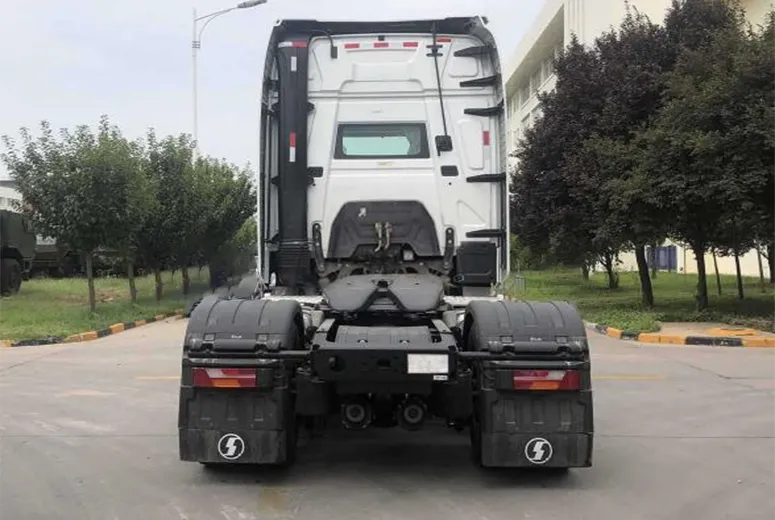Optimizing Fuel Efficiency in Heavy-Duty Trucks: Best Practices for Fleet Operators
Fuel efficiency is a critical concern for heavy-duty trucks, especially given the increasing cost of fuel and the need to minimize environmental impact. For fleet operators, optimizing fuel consumption can result in significant savings and a lower carbon footprint. Implementing strategies such as improving aerodynamics, reducing vehicle weight, and utilizing advanced fuel management systems can greatly enhance fuel efficiency. Whether looking to invest in new trucks for sale or upgrade an existing fleet, there are numerous practical solutions to consider.

Aerodynamic Enhancements for Heavy-Spec Trucks
Aerodynamics plays a key role in the fuel efficiency of heavy-spec trucks. When trucks travel at high speeds, air resistance increases significantly, causing higher fuel consumption. Adding aerodynamic modifications, such as roof fairings, side skirts, and front air deflectors, helps streamline the vehicle's shape and reduces drag. This allows heavy-duty trucks to cut through the air more efficiently, resulting in fuel savings, particularly on long highway routes. These adjustments not only improve fuel efficiency but also reduce wear on the engine, leading to longer vehicle lifespans and lower maintenance costs for heavy-spec trucks.
Reducing Weight in Trucks for Heavy Load
Weight is a major factor in the fuel consumption of trucks for heavy loads. Heavier vehicles naturally require more fuel to move, especially when carrying large, dense cargo. By reducing the weight of the truck itself, fleet operators can improve fuel efficiency without sacrificing load capacity. The use of lightweight materials such as aluminum and high-strength steel can significantly reduce the vehicle's overall weight, making it easier to transport heavy loads with less fuel. Lighter trucks for heavy loads also experience less wear on their components, which can lead to fewer breakdowns and reduced long-term maintenance expenses.
Advanced Fuel Management for 4 Wheel Drive Heavy Duty Trucks
Fuel management systems are essential for optimizing the fuel efficiency of 4-wheel drive heavy-duty trucks, especially in challenging terrain where these vehicles are commonly used. Advanced fuel management technology monitors engine performance, speed, and driving conditions in real time, allowing the system to adjust fuel consumption dynamically. For instance, when 4-wheel drive heavy-duty trucks are operating on rough or off-road surfaces, the system ensures fuel is used more efficiently by adjusting the power output to match the terrain. This reduces unnecessary fuel waste and improves overall fuel economy, making these systems highly valuable for fleet operators.
Tire Maintenance for Heavy-Duty Trucks
Proper tire maintenance is crucial for the fuel efficiency of heavy-duty trucks. Under-inflated or worn-out tires create greater rolling resistance, forcing the engine to work harder and consume more fuel. Ensuring that tires are properly inflated and regularly inspected for wear can significantly improve fuel economy. Fleet operators should also consider using low rolling-resistance tires, which are specifically designed to minimize the energy required to keep the truck moving. These tires are especially useful for heavy-duty trucks carrying large cargo over long distances, where small improvements in efficiency can translate into substantial fuel savings.
The Future of Fuel Efficiency for New Trucks for Sale
As technology continues to evolve, new trucks for sale are becoming more fuel-efficient, with manufacturers focusing on reducing emissions and enhancing performance. Hybrid and electric heavy-duty trucks are now available, providing fleet operators with an alternative to traditional diesel-powered vehicles. These trucks offer lower fuel costs, reduced environmental impact, and quieter operation, making them ideal for both urban and long-haul applications. Investing in these new trucks for sale can not only enhance fuel efficiency but also help fleet operators meet stricter environmental regulations, making them a forward-thinking choice for businesses focused on sustainability.
Improving the fuel efficiency of heavy-duty trucks involves a combination of practical strategies and advanced technologies. By focusing on aerodynamic improvements, reducing vehicle weight, utilizing fuel management systems, and maintaining tires properly, fleet operators can achieve significant savings in fuel costs. As the industry shifts toward more fuel-efficient and environmentally friendly options, investing in newer technologies and new trucks for sale will be crucial for long-term success in the transportation sector. Embracing these changes allows fleet operators to stay competitive while contributing to a more sustainable future.
-
Low Maintenance + High Availability of Ownership for Mining Dump TruckNewsJul.17,2025
-
Drum Drive Axle + Air Suspension for Electric Tractor TruckNewsJul.17,2025
-
33m Boom + Full Hydraulic Outriggers: Narrow-Site Construction Practices of Mixer Pump TruckNewsJul.17,2025
-
18L Large Drum + Extended Drain Interval of Gear Oil for Heavy Duty TrucksNewsJul.17,2025
-
13m Cargo Space + Polyurethane Insulation: Long-Term Cold Chain Protection Solutions for Refrigerated Semi-Trailers for SaleNewsJul.17,2025
-
10T Water Tank + 2.5MPa Fire Pump Efficiency Analysis of Water Tank Fire TruckNewsJul.17,2025
Popular products

























